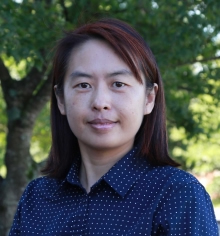
UNC Charlotte researchers have received two of 43 awards from the inaugural round of grants from the National Science Foundation’s (NSF) Convergence Accelerator pilot. The new NSF initiative supports multidisciplinary research teams and lays the groundwork for public-private partnerships with Fortune 500 companies to apply Big Data to science and engineering, and create technologies that enhance the lives of American workers.
The Convergence Accelerator is based on the premise that investing in “convergent approaches”--the collaborative and integrated work of experts across a variety of disciplines—will produce outcomes of greater value and impact for industry, government and the nonprofit sector than those of singular efforts as they explore solutions to complex societal problems.
“For decades, the private sector has not been able to justify investment in basic research due to a lack of obvious commercial applications,” said Douglas Maughan, NSF’s Convergence Accelerator office head. “With the Convergence Accelerator, we’re challenging that notion as we partner with others whose work will potentially change and enhance society.”
Funding to UNC Charlotte will support two separate projects. The first will address an across-the-board workforce challenge by using Artificial Intelligence (AI) to develop an innovative smart training program that will be applicable across industries. The other will make possible the development and accessibility of a federal database that stores political, public policy, economic and social information that currently is available only state-by-state.
 Award recipient Aidong Lu, a UNC Charlotte computer scientist, and her team will develop a smart, AI-driven training platform that uses advances in virtual reality/mixed reality, smart sensing and kinesiology to create individualized training for firefighters. Due to the increasing use of technology in modern firefighting and the training required for firefighters to remain up to date, a platform that offers advanced techniques of big data, AI, smart sensing, mixed reality, kinesiology and fire engineering could accelerate the change from traditional training programs to new types of training and certification.
Award recipient Aidong Lu, a UNC Charlotte computer scientist, and her team will develop a smart, AI-driven training platform that uses advances in virtual reality/mixed reality, smart sensing and kinesiology to create individualized training for firefighters. Due to the increasing use of technology in modern firefighting and the training required for firefighters to remain up to date, a platform that offers advanced techniques of big data, AI, smart sensing, mixed reality, kinesiology and fire engineering could accelerate the change from traditional training programs to new types of training and certification.
According to Lu, whose team will partner with North Carolina Agricultural and Technical State University and the University of Arkansas, the smart training platform is planned as a significant improvement to --rather than a substitute for--traditional training. “The goal is to make learning deeper and training more effective,” she said.
A defining characteristic of the technologies to be developed is applicability. In an environment that requires workers to be learning all the time to remain qualified and certified for their jobs, this new approach holds the potential to revolutionize the way job training is delivered for a number of industries.
The second award is to UNC Charlotte political scientist Jason Windett, whose team is tackling a fundamental problem in U.S. public policy research: the inability of researchers to compare social, economic or other outcomes across states due to the decentralized nature of data collection and analysis.
“Researchers are often forced to engage in 50 separate data collection processes and navigate the related challenges state-by-state,” said Windett, who added that researchers sometimes avoid the complexities of sharing data by electing not to do so. “Compounding the situation is the fact that for those who do make their data publicly available, there is no obvious way to connect it to data collected by others.”
 Windett, along with experts from several partner organizations, will develop the Federalism Data and Advanced Statistics Hub (F-DASH), a comprehensive source of data and analysis related to governing institutions and public policies across the United States. Collaborating organizations include Open States, the Society for Public Health Educators, and the American Political Science Association. In addition to creating a centralized location for data collection and analysis, F-DASH will integrate an unprecedented amount of data collected by states on politics, public policy and economic and social outcomes, and develop tools that allow users to explore, visualize and analyze data. According to Windett, this development should lead to wide social benefit for educators, researchers and the public, and “facilitating engagement by citizens, new classroom materials for teachers, innovations by practitioners and breakthroughs by researchers.”
Windett, along with experts from several partner organizations, will develop the Federalism Data and Advanced Statistics Hub (F-DASH), a comprehensive source of data and analysis related to governing institutions and public policies across the United States. Collaborating organizations include Open States, the Society for Public Health Educators, and the American Political Science Association. In addition to creating a centralized location for data collection and analysis, F-DASH will integrate an unprecedented amount of data collected by states on politics, public policy and economic and social outcomes, and develop tools that allow users to explore, visualize and analyze data. According to Windett, this development should lead to wide social benefit for educators, researchers and the public, and “facilitating engagement by citizens, new classroom materials for teachers, innovations by practitioners and breakthroughs by researchers.”
“UNC Charlotte researchers are embracing the exploration of scholarly topics that cross traditional boundaries and forge new, emerging disciplines,” said Rick Tankersley, the University’s vice chancellor for research and economic development. “Both projects chosen for inaugural Convergence Accelerator awards reflect the University’s commitment to fostering partnerships with industry and government and facilitating collaborative, team-centric approaches to complex scientific and social problems.”
For its first round of Convergence Accelerator awards, the National Science Foundation made grants to 43 projects based at leading research institutions across the United States of up to $1 million each for a total of $39 million. Awards from the initiative to UNC Charlotte total nearly $2 million, bringing funding for current NSF-supported projects at UNC Charlotte to over $51 million.